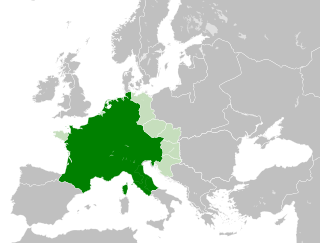
The Carolingian Empire (800–888) was a large Frankish-dominated empire in western and central Europe during the early Middle Ages. It was ruled by the Carolingian dynasty, which had ruled as kings of the Franks since 751 and as kings of the Lombards in Italy from 774. In 800, the Frankish king Charlemagne was crowned emperor in Rome by Pope Leo III in an effort to transfer the Roman Empire from east to west. The Carolingian Empire is considered the first phase in the history of the Holy Roman Empire, which lasted until 1806.
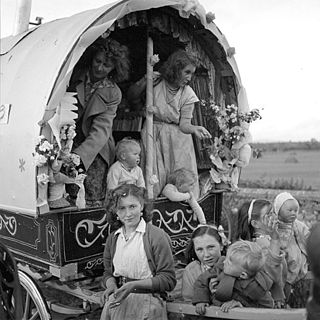
Irish Travellers, also known as Pavees, are an itinerant ethnic group whose members maintain a set of traditions. They are predominantly English-speaking, though many also speak Shelta. Religiously, the majority of Irish Travellers are Catholic.

The Romani genocide or the Romani Holocaust—also known as the Porajmos, the Pharrajimos, and the Samudaripen —was the effort by Nazi Germany and its World War II allies to commit ethnic cleansing and eventually genocide against Europe's Romani people.
Pikey is a slang term, which is pejorative and considered by many to be a slur. It is used mainly in the UK to refer to people who are of the Irish Traveller community, an ethnic group originating in Ireland and also found in Great Britain. It is also used against Romanichal Travellers, Welsh Kale, Scottish Lowland Travellers, Scottish Highland Travellers and Funfair Travellers too.

Tinker or tinkerer is an archaic term for an itinerant tinsmith who mends household utensils.
In law enforcement in the United States, a gypsy cop, also known as a wandering police officer, is a police officer who frequently transfers between police departments, having a record of misconduct or unsuitable job performance. The term is slang, referencing the stereotypical nomadic lifestyle of the Romani people, pejoratively "Gypsies".
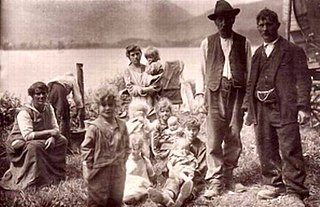
The Yenish are an itinerant group in Western Europe, living mostly in Germany, Austria, Switzerland, Luxembourg, Belgium and parts of France, roughly centred on the Rhineland. They are descended from members of the marginalized and vagrant poor classes of society of the early modern period, and emerged as a distinct group by the early 19th century. In this regard, and also in their lifestyle, they resemble the Scottish and Irish Travellers. Most of the Yenish have become sedentary in the course of the mid-19th to 20th centuries.

A peddler, in British English pedlar, also known as a canvasser, chapman, cheapjack, hawker, higler, huckster, monger, colporteur or solicitor, is a traveling vendor of goods.

New Age travellers or crusties are people in the UK who often espouse New Age beliefs, and the hippie culture of the 1960s, and travel between music festivals and fairs, in order to live in a community with others who hold similar beliefs. A crusty's transport and home may consist of a van, lorry, bus, car, or caravan converted into a mobile home. A crusty may also make use of an improvised bender tent, tipi, or yurt. "New Age" travellers largely originated in 1980s and early 1990s Britain, when they were described as crusties because of the association with "encrusted dirt, dirt as a deliberate embrace of grotesquerie, a statement of resistance against society, proof of nomadic hardship."
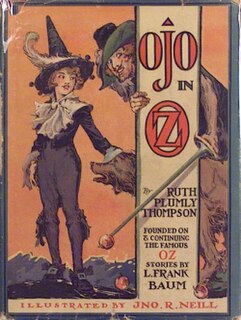
Ojo in Oz (1933) is the twenty-seventh in the series of Oz books created by L. Frank Baum and his successors, and the thirteenth written by Ruth Plumly Thompson. It was illustrated by John R. Neill.
Romanichal Travellers ( ), are a Romani sub-group in the United Kingdom and other parts of the English-speaking world.
The term English Travellers refers to itinerant groups, and may mean:
Scottish Travellers, or the people in Scotland loosely termed gypsies or travellers, consist of a number of diverse, unrelated communities that speak a variety of different languages and dialects that pertain to distinct customs, histories, and traditions.
Zott is the Arabic term for gypsies, Romani people and Dom people. The Zott were musicians who migrated in great numbers from Pakistan and India to Middle East about 1000 years ago. Their name was later applied to any itinerant entertainer of Indian origin, and came to be the common name of the Dom people in the Middle East, as English gypsy or tinker with contemptuous connotations. The Al-Qamus Al-Muhit glosses the term as equivalent to Nawar.
Gypsy is a name for the Romani people, an ethnic group of South Asian origin.
An eyre or iter was the name of a circuit travelled by an itinerant justice in medieval England, or the circuit court over which they presided, or the right of the monarch to visit and inspect the holdings of any vassal. The eyre involved visits and inspections at irregular intervals of the houses of vassals in the kingdom. The term is derived from Old French erre, from Latin iter ("journey"), and is cognate with errand and errant.

The Romani people are also known by a variety of other names; in English as gypsies or gipsies and Roma, in Greek as γύφτοι (gíftoi) or τσιγγάνοι (tsiggánoi), in Central and Eastern Europe as Tsingani, in France as gitans besides the dated bohémiens, manouches, in Italy as zingari and gitani, in Spain as gitanos, and in Portugal as ciganos.
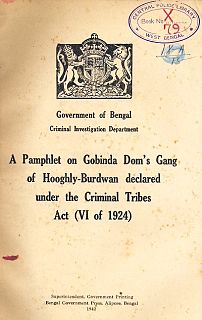
Various pieces of legislation in India during British rule since the 1870s were collectively called the Criminal Tribes Act (CTA). They criminalized entire communities by designating them as habitual criminals. Under these acts, ethnic or social communities in India which were defined as "addicted to the systematic commission of non-bailable offences" such as thefts, were systematically registered by the government. Since they were described as "habitually criminal", restrictions on their movements were also imposed. Adult male members of such groups were forced to report weekly to the local police.

An itinerant preacher is a Christian evangelist who preaches the basic Christian redemption message while traveling around to different groups of people within a relatively short period of time. The movement is different from longer term church planting missions and discipleship.

There are a number of traditionally itinerant or travelling groups in Europe who are known as "Travellers" or "Gypsies".











